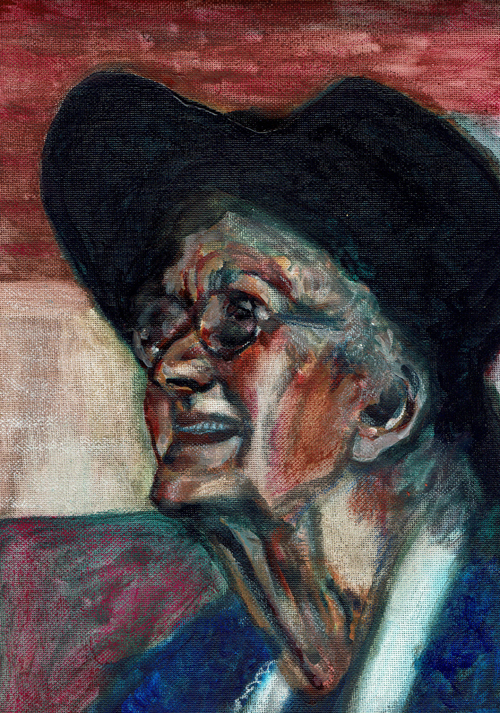
Your complimentary articles
You’ve read one of your four complimentary articles for this month.
You can read four articles free per month. To have complete access to the thousands of philosophy articles on this site, please
Obituary
Mary Midgley (September 13, 1919 - October 10, 2018)
Carol Nicholson on a remarkable ethicist and Philosophy Now contributor.
Mary Midgley, one of the leading and most illuminating moral philosophers of our time, published her last book (What is Philosophy For?) only a couple of weeks before her death on October 10 at the age of ninety-nine. Raymond Tallis praised the book as a brilliant, lucid, and witty assault on the distorted world-view of our age and a compelling defence of philosophy as the discipline that is needed to rescue us. Midgley read widely in the history of philosophy as well as in the sciences and the humanities, and she was too open-minded to be affiliated with any particular school of thought. She was celebrated as having one of the sharpest pens in the West, pulling no punches in her criticism of the claims that traditional philosophy is obsolete and that modern science has a monopoly on the truth.

Mary Midgley by Gail Campbell 2018
After raising three sons with her husband Geoffrey Midgley, also a philosophy teacher, Midgley taught at Newcastle University for many years, and it was not until near the age of sixty that she began writing the work that would make her famous. In 1978 she published Beast and Man: The Roots of Human Nature. This was the first of over a dozen books she wrote alongside hundreds of articles during the next forty years on a wide variety of topics including human nature, ethics, science, animals, and the environment. Her prose is remarkably clear and free of jargon, making her work accessible to the general reader as well as academic specialists, and she had a gift for using vivid imagery to illustrate abstract philosophical concepts. Perhaps her most memorable metaphor is the suggestion that philosophy can be understood as a form of plumbing. Our thinking depends on unstated assumptions that we don’t notice until bad smells come up from below the floor, and we’re forced to reexamine the deep infrastructure of our life as a whole to find the central confusions and conflicts that are causing the serious problems in the pipes. Midgley thought that this kind of plumbing has always been the main job of philosophy, and it never goes out of date. It’s something that we all do all the time.
In another apt figure of speech, Midgley described philosophy as “conceptual geography.” She saw mind and matter not as two kinds of stuff but as two ways of mapping the relations between various ways of thinking about different kinds of questions. The relationship between thoughts and brain states is analogous to the way in which thunder and lightning are different ways of perceiving a single reality. We use both sight and touch to navigate the world, and neither sense is truer than the other any more than the inside of a teapot is more real than the outside. These clever metaphors and analogies exemplify a central theme in Midgley’s writings, the need to balance the scientific analysis of things into their parts with the more holistic perspective that philosophy can provide. In Are You An Illusion? (2014) she insightfully discussed Iain McGilchrist’s idea in The Master and his Emissary that the two hemispheres of the brain deliver to us different versions of the world. The left brain focuses attention narrowly and precisely, while the right brain takes a broader point of view and evaluates the relevance of the parts of experience in light of the larger context.
Midgley pointed out that scientific reductionism distorts our experience by rejecting altogether the validity of the perspective of the right hemisphere, resulting in a kind of tunnel vision. The left hemisphere on its own can see only the pieces that make up the world and therefore insists that physics tells us the whole truth about reality. But physics, like every particular science, is in Midgley’s words “a one-sided story, an abstraction, a view seen through a single window.” In The Solitary Self (2010) she identified another symptom of left-brain obsession in the reductive individualism of the concept of the ‘selfish gene’. According to Midgley, this is a serious misinterpretation of Darwin, who viewed all organisms as interdependent parts of complex ecosystems rather than isolated atoms in a mythical Hobbesian state of nature. She argued that we need to use our entire brain with both halves working together, so philosophy and the sciences should complement each other rather than competing for the prize of a one-dimensional ultimate truth. An example of this kind of cooperation between scientific research and philosophical vision is the Gaia hypothesis that the Earth can be viewed as a living organism, an idea that Midgley defended as an enormously fruitful suggestion.
Her final answer to the question “What is philosophy for?” is that its aim is not at all like that of the sciences. Scientists are specialists who study parts of the world, but philosophy concerns everybody. It tries to bring together aspects of life that have previously been unconnected in order to make a more coherent world-picture, which is not a private luxury but something absolutely essential for human life. I never met Midgley, but she spoke powerfully to my condition, and I shall miss her as if she had been one of my dearest friends. At a time when philosophy departments in many universities are being drastically cut or eliminated, her message is urgently important, and I hope that it will be heard for as long as there is human life on earth.
© Professor Carol Nicholson 2018
Carol Nicholson has been teaching at Rider University in New Jersey for over 40 years. The Rider Philosophy Department has recently been cut in half from four full-time faculty members to two.









